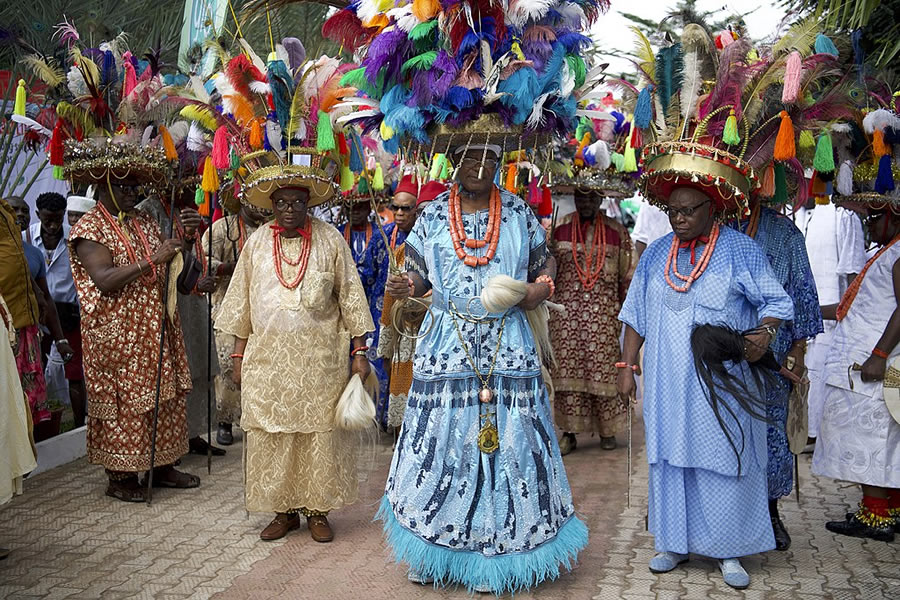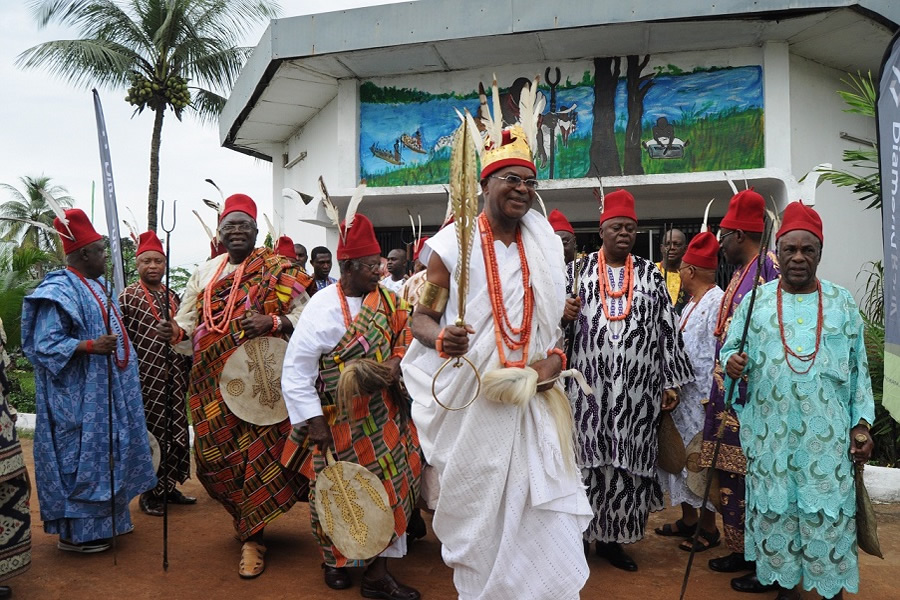Ofala Festival is one of the most popular festivals in Onitsha. Onitsha indigenes are a people, who cherish their heritage and value their culture very much in spite of their early contact with education. This is why they pay attention to the traditional ceremonies that abound. Some of these ceremonies include, the coronation of a new monarch, chieftaincy installation, initiation into the masquerade cult, Ozo title-taking, initiation into the Otu Odu Cultural group, burial rites, and so on.However, the Ofala festival seems to be the most significant and prestigious of all the ceremonies performed in Onitsha. The festival varies from community to community in Igbo land. In other places, it may be the coronation of a chief, to mark an anniversary, or the coronation of an igwe or eze.

source: Wikimedia
The Ofala Festival
The Onitsha Ofala festival dates back to about 700 years ago, at the time of Eze Chima, the first monarch, who migrated to the area, now known as Onitsha (Henderson 42-46). In those early days, the King of Onitsha, referred to as, Igwe-Onitsha, was always confined to the palace. He did not have any business going anywhere because the responsibilities of administering the community was assigned to his lieutenants, who are the elders, known as the Ndi-Ichie, and other rank and file of the community. The Igwe, also known as the Obi-Onitsha, only made public appearances during the Ofala festival. It is pertinent to note here that the Ofala festival is celebrated only once a year, precisely in the month of October, the period that is the climax of the celebration of the new yam.
Four days before the festival, the Igwe goes into seclusion. He retreats to commune with his ancestors, and to thank them for protecting him and his subjects for the past one year as well as pray for peace and prosperity in the year to come.On the day of the festival, the Obi makes three appearances. After the early morning rituals, the trumpeters announce his entry before he shows up, fully dressed in his royal regalia, highlighted with the royal crown (okpu ododo), acknowledging the crowd that would have gathered by waving at all the directions to the people and then returns inside.
During the second outing, the trumpets are blown again and the Obi comes out and seats on his throne. This is followed by the entrance of the red-capped chiefs (ndi-Ichie) also well-dressed in their traditional attires in batches, according to their village music and in order of seniority, proceed to pay homage to the Obi by kneeling down to bow before him and sing his praises, after which he now performs the function of Iwa-ji (celebration of the first yam) to mark the official declaration of harvest season. After this, the Igwe (Obi) returns into the inner chambers before he finally comes out the third time.

At the third entry, the royal music plays and sets, the rhythm for Obi’s dancing (egwu ota) as he makes his appearance, amid cheers and praises from the crowd, he steps into the arena and dances to the tune of the drummers. He dances in turns with his first wife, his first son and first daughter and returns to his throne giving way to a parade of dances by different groups such as titled men, the Otu Odu Association, age-grade groups, friends and well-wishers all dressed in colourful traditional apparels.
It serves as a rites of renewal of the king or Obi.The term ofala, is derived from two Igbo words - ofo (authority) and ala (land).The festival is celebrated within two days mostly in October by the king or Obi.
Emergency Number: 112
Banks in Anambra
Brief History of Anambra
Business and Economy
General and Teaching Hospitals
Hotels and Guest Houses
Anambra State Ministries Agencies and Parastatals
Police Stations
Popular Markets
Restaurants, Bars and Night Clubs
Shopping Malls
Traditional Rulers
FESTIVALS and CARNIVALS
Alo Mmo New Yam Festival
Igu Aro Festival
Ijele Masquarade Festival
Ime Ogbe Festival
Mmanwu Festival
Ofala Festival
Uzo Iyi Festival
TOURIST ATTARCTIONS
Agulu Lake
Igbo Ukwu Museum
Ogbunike Caves
Rojenny Tourist Village Oba
Banks in Anambra
Brief History of Anambra
Business and Economy
General and Teaching Hospitals
Hotels and Guest Houses
Anambra State Ministries Agencies and Parastatals
Police Stations
Popular Markets
Restaurants, Bars and Night Clubs
Shopping Malls
Traditional Rulers
FESTIVALS and CARNIVALS
Alo Mmo New Yam Festival
Igu Aro Festival
Ijele Masquarade Festival
Ime Ogbe Festival
Mmanwu Festival
Ofala Festival
Uzo Iyi Festival
TOURIST ATTARCTIONS
Agulu Lake
Igbo Ukwu Museum
Ogbunike Caves
Rojenny Tourist Village Oba
Connect With Us
 |
 |
 |
 |
